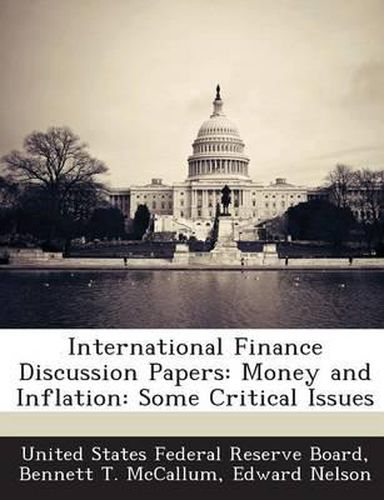Readings Newsletter
Become a Readings Member to make your shopping experience even easier.
Sign in or sign up for free!
You’re not far away from qualifying for FREE standard shipping within Australia
You’ve qualified for FREE standard shipping within Australia
The cart is loading…






We consider what, if any, relationship there is between monetary aggregates and inflation, and whether there is any substantial reason for modifying the current mainstream mode of policy analysis, which frequently does not consider monetary aggregates at all. We begin by considering the body of thought known as the \“quantity theory of money.\” The quantity theory centers on the prediction that there will be a long-run proportionate reaction of the price level to an exogenous increase in the nominal money stock. The nominal homogeneity conditions that deliver the quantity-theory result are the same as those that deliver monetary neutrality, an important principle behind policy formulation. The quantity theory implies a ceteris paribus unitary relationship between inflation and money growth. Simulations of a New Keynesian model suggest that we should expect this relationship to be apparent in time series data, with no heavy averaging or filtering required, but with allowance needed for the phase shift in the relationship between monetary growth rates and inflation. While financial innovation can obscure the relationship between monetary growth and inflation, evidence of a money growth/inflation relationship does emerge from U.S. time series and G7 panel data. Various considerations suggest that studies of inflation and monetary policy behavior can benefit from including both interest rates and money in the empirical analysis.
$9.00 standard shipping within Australia
FREE standard shipping within Australia for orders over $100.00
Express & International shipping calculated at checkout
We consider what, if any, relationship there is between monetary aggregates and inflation, and whether there is any substantial reason for modifying the current mainstream mode of policy analysis, which frequently does not consider monetary aggregates at all. We begin by considering the body of thought known as the \“quantity theory of money.\” The quantity theory centers on the prediction that there will be a long-run proportionate reaction of the price level to an exogenous increase in the nominal money stock. The nominal homogeneity conditions that deliver the quantity-theory result are the same as those that deliver monetary neutrality, an important principle behind policy formulation. The quantity theory implies a ceteris paribus unitary relationship between inflation and money growth. Simulations of a New Keynesian model suggest that we should expect this relationship to be apparent in time series data, with no heavy averaging or filtering required, but with allowance needed for the phase shift in the relationship between monetary growth rates and inflation. While financial innovation can obscure the relationship between monetary growth and inflation, evidence of a money growth/inflation relationship does emerge from U.S. time series and G7 panel data. Various considerations suggest that studies of inflation and monetary policy behavior can benefit from including both interest rates and money in the empirical analysis.